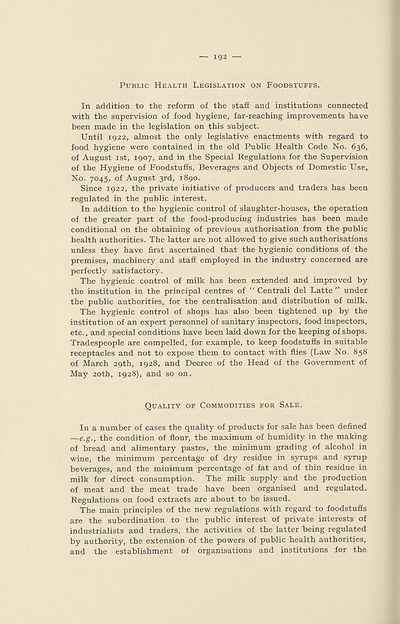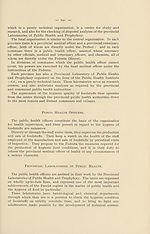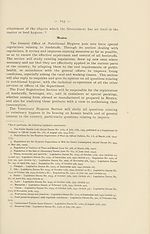Download files
Complete book:
Individual page:
Thumbnail gallery: Grid view | List view

192
Public Health Legislation on Foodstuffs.
In addition to the reform of the staff and institutions connected
with the supervision of food hygiene, far-reaching improvements have
been made in the legislation on this subject.
Until 1922, almost the only legislative enactments with regard to
food hygiene were contained in the old Public Health Code No. 636,
of August 1st, 1907, and in the Special Regulations for the Supervision
of the Hygiene of Foodstuffs, Beverages and Objects of Domestic Use,
No. 7045, of August 3rd, 1890.
Since 1922, the private initiative of producers and traders has been
regulated in the public interest.
In addition to the hygienic control of slaughter-houses, the operation
of the greater part of the food-producing industries has been made
conditional on the obtaining of previous authorisation from the public
health authorities. The latter are not allowed to give such authorisations
unless they have first ascertained that the hygienic conditions of the
premises, machinery and staff employed in the industry concerned are
perfectly satisfactory.
The hygienic control of milk has been extended and improved by
the institution in the principal centres of “ Centrali del Latte" under
the public authorities, for the centralisation and distribution of milk.
The hygienic control of shops has also been tightened up by the
institution of an expert personnel of sanitary inspectors, food inspectors,
etc., and special conditions have been laid down for the keeping of shops.
Tradespeople are compelled, for example, to keep foodstuffs in suitable
receptacles and not to expose them to contact with flies (Law No. 858
of March 29th, 1928, and Decree of the Head of the Government of
May 20th, 1928), and so on.
Quality of Commodities for Sale.
In a number of cases the quality of products for sale has been defined
—e.g., the condition of flour, the maximum of humidity in the making
of bread and alimentary pastes, the minimum grading of alcohol in
wine, the minimum percentage of dry residue in syrups and syrup
beverages, and the minimum percentage of fat and of thin residue in
milk for direct consumption. The milk supply and the production
of meat and the meat trade have been organised and regulated.
Regulations on food extracts are about to be issued.
The main principles of the new regulations with regard to foodstuffs
are the subordination to the public interest of private interests of
industrialists and traders, the activities of the latter being regulated
by authority, the extension of the powers of public health authorities,
and the establishment of organisations and institutions for the
Public Health Legislation on Foodstuffs.
In addition to the reform of the staff and institutions connected
with the supervision of food hygiene, far-reaching improvements have
been made in the legislation on this subject.
Until 1922, almost the only legislative enactments with regard to
food hygiene were contained in the old Public Health Code No. 636,
of August 1st, 1907, and in the Special Regulations for the Supervision
of the Hygiene of Foodstuffs, Beverages and Objects of Domestic Use,
No. 7045, of August 3rd, 1890.
Since 1922, the private initiative of producers and traders has been
regulated in the public interest.
In addition to the hygienic control of slaughter-houses, the operation
of the greater part of the food-producing industries has been made
conditional on the obtaining of previous authorisation from the public
health authorities. The latter are not allowed to give such authorisations
unless they have first ascertained that the hygienic conditions of the
premises, machinery and staff employed in the industry concerned are
perfectly satisfactory.
The hygienic control of milk has been extended and improved by
the institution in the principal centres of “ Centrali del Latte" under
the public authorities, for the centralisation and distribution of milk.
The hygienic control of shops has also been tightened up by the
institution of an expert personnel of sanitary inspectors, food inspectors,
etc., and special conditions have been laid down for the keeping of shops.
Tradespeople are compelled, for example, to keep foodstuffs in suitable
receptacles and not to expose them to contact with flies (Law No. 858
of March 29th, 1928, and Decree of the Head of the Government of
May 20th, 1928), and so on.
Quality of Commodities for Sale.
In a number of cases the quality of products for sale has been defined
—e.g., the condition of flour, the maximum of humidity in the making
of bread and alimentary pastes, the minimum grading of alcohol in
wine, the minimum percentage of dry residue in syrups and syrup
beverages, and the minimum percentage of fat and of thin residue in
milk for direct consumption. The milk supply and the production
of meat and the meat trade have been organised and regulated.
Regulations on food extracts are about to be issued.
The main principles of the new regulations with regard to foodstuffs
are the subordination to the public interest of private interests of
industrialists and traders, the activities of the latter being regulated
by authority, the extension of the powers of public health authorities,
and the establishment of organisations and institutions for the
Set display mode to:
![]() Universal Viewer |
Universal Viewer | ![]() Mirador |
Large image | Transcription
Mirador |
Large image | Transcription
Images and transcriptions on this page, including medium image downloads, may be used under the Creative Commons Attribution 4.0 International Licence unless otherwise stated. ![]()
| League of Nations > Economic and financial section > Problem of nutrition > (194) |
|---|
| Permanent URL | https://digital.nls.uk/190926284 |
|---|
| Shelfmark | LN.II |
|---|
| Description | Over 1,200 documents from the non-political organs of the League of Nations that dealt with health, disarmament, economic and financial matters for the duration of the League (1919-1945). Also online are statistical bulletins, essential facts, and an overview of the League by the first Secretary General, Sir Eric Drummond. These items are part of the Official Publications collection at the National Library of Scotland. |
|---|---|
| Additional NLS resources: |
|

